英美概况——英国历史
- 格式:ppt
- 大小:329.00 KB
- 文档页数:23
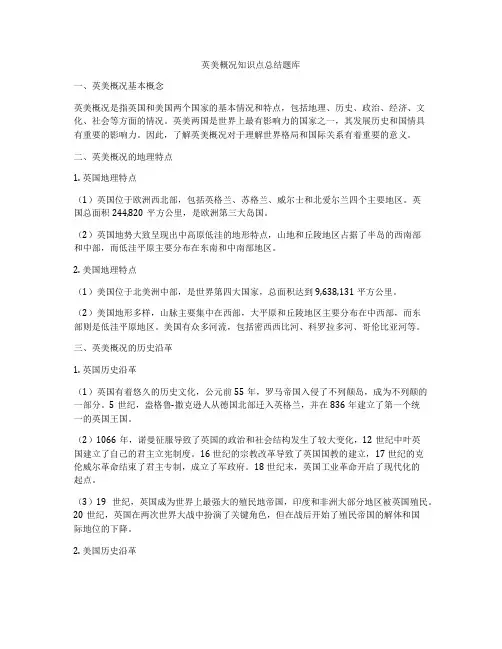
英美概况知识点总结题库一、英美概况基本概念英美概况是指英国和美国两个国家的基本情况和特点,包括地理、历史、政治、经济、文化、社会等方面的情况。
英美两国是世界上最有影响力的国家之一,其发展历史和国情具有重要的影响力。
因此,了解英美概况对于理解世界格局和国际关系有着重要的意义。
二、英美概况的地理特点1. 英国地理特点(1)英国位于欧洲西北部,包括英格兰、苏格兰、威尔士和北爱尔兰四个主要地区。
英国总面积244,820平方公里,是欧洲第三大岛国。
(2)英国地势大致呈现出中高原低洼的地形特点,山地和丘陵地区占据了半岛的西南部和中部,而低洼平原主要分布在东南和中南部地区。
2. 美国地理特点(1)美国位于北美洲中部,是世界第四大国家,总面积达到9,638,131平方公里。
(2)美国地形多样,山脉主要集中在西部,大平原和丘陵地区主要分布在中西部,而东部则是低洼平原地区。
美国有众多河流,包括密西西比河、科罗拉多河、哥伦比亚河等。
三、英美概况的历史沿革1. 英国历史沿革(1)英国有着悠久的历史文化,公元前55年,罗马帝国入侵了不列颠岛,成为不列颠的一部分。
5世纪,盎格鲁-撒克逊人从德国北部迁入英格兰,并在836年建立了第一个统一的英国王国。
(2)1066年,诺曼征服导致了英国的政治和社会结构发生了较大变化,12世纪中叶英国建立了自己的君主立宪制度。
16世纪的宗教改革导致了英国国教的建立,17世纪的克伦威尔革命结束了君主专制,成立了军政府。
18世纪末,英国工业革命开启了现代化的起点。
(3)19世纪,英国成为世界上最强大的殖民地帝国,印度和非洲大部分地区被英国殖民。
20世纪,英国在两次世界大战中扮演了关键角色,但在战后开始了殖民帝国的解体和国际地位的下降。
2. 美国历史沿革(1)美国历史的起源可以追溯到公元前1492年,哥伦布发现了北美大陆。
17世纪早期,英国殖民者开始在北美建立殖民地。
(2)18世纪末,美国爆发了独立战争,美国终于于1776年宣布独立,建立了独立的民主共和国。
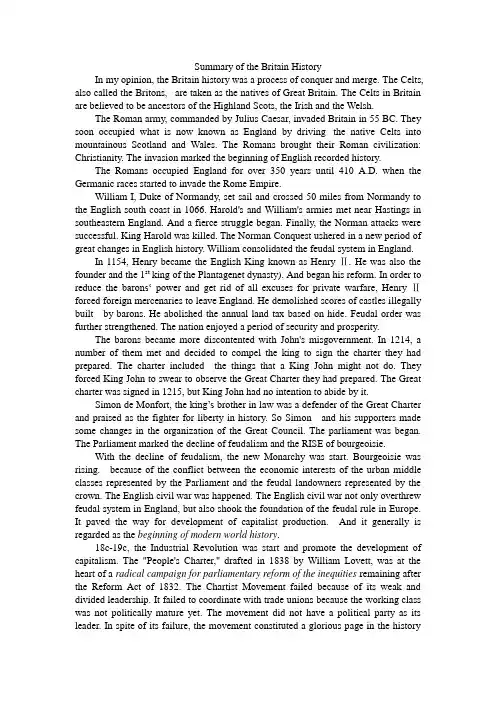
Summary of the Britain HistoryIn my opinion, the Britain history was a process of conquer and merge. The Celts, also called the Britons, are taken as the natives of Great Britain. The Celts in Britain are believed to be ancestors of the Highland Scots, the Irish and the Welsh.The Roman army, commanded by Julius Caesar, invaded Britain in 55 BC. They soon occupied what is now known as England by driving the native Celts into mountainous Scotland and Wales. The Romans brought their Roman civilization: Christianity. The invasion marked the beginning of English recorded history.The Romans occupied England for over 350 years until 410 A.D. when the Germanic races started to invade the Rome Empire.William I, Duke of Normandy, set sail and crossed 50 miles from Normandy to the English south coast in 1066. Harold's and William's armies met near Hastings in southeastern England. And a fierce struggle began. Finally,the Norman attacks were successful. King Harold was killed. The Norman Conquest ushered in a new period of great changes in English history. William consolidated the feudal system in England.In 1154, Henry became the English King known as Henry Ⅱ. He was also the founder and the 1st king of the Plantagenet dynasty). And began his reform.In order to reduce the barons‘power and get rid of all excuses for private warfare, Henry Ⅱforced foreign mercenaries to leave England. He demolished scores of castles illegally built by barons. He abolished the annual land tax based on hide. Feudal order was further strengthened. The nation enjoyed a period of security and prosperity.The barons became more discontented with John's misgovernment. In 1214, a number of them met and decided to compel the king to sign the charter they had prepared. The charter included the things that a King John might not do. They forced King John to swear to observe the Great Charter they had prepared. The Great charter was signed in 1215, but King John had no intention to abide by it.Simon de Monfort, the king’s brother in law was a defender of the Great Charter and praised as the fighter for liberty in history. So Simon and his supporters made some changes in the organization of the Great Council. The parliament was began. The Parliament marked the decline of feudalism and the RISE of bourgeoisie.With the decline of feudalism, the new Monarchy was start. Bourgeoisie was rising. because of the conflict between the economic interests of the urban middle classes represented by the Parliament and the feudal landowners represented by the crown. The English civil war was happened. The English civil war not only overthrew feudal system in England, but also shook the foundation of the feudal rule in Europe. It paved the way for development of capitalist production. And it generally is regarded as the beginning of modern world history.18c-19c, the Industrial Revolution was start and promote the development of capitalism. The "People's Charter," drafted in 1838 by William Lovett, was at the heart of a radical campaign for parliamentary reform of the inequities remaining after the Reform Act of 1832. The Chartist Movement failed because of its weak and divided leadership. It failed to coordinate with trade unions because the working class was not politically mature yet. The movement did not have a political party as its leader. In spite of its failure, the movement constituted a glorious page in the historyof the workers' struggle for liberation. The six points demanded by the Chartists were gradually achieved over the period between 1858 and 1918.Britain through colonial expansion, became The Sun Never Set on the British Empireduring the world war, The British had suffered millions of casualties and liquidated assets at an alarming rate, which led to debt accumulation and manpower deficiencies in the staffing(调配) of far-flung imperial posts(基地) in Asia and the African colonies. finally, The Sun Never Set on the British Empire was fall.。

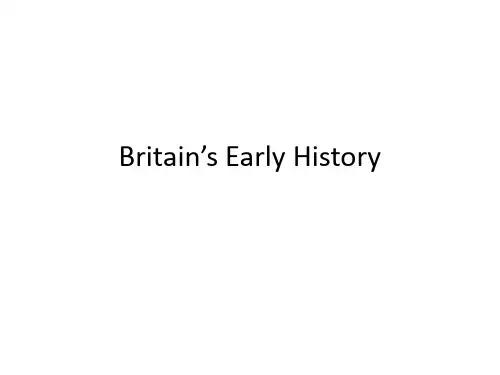
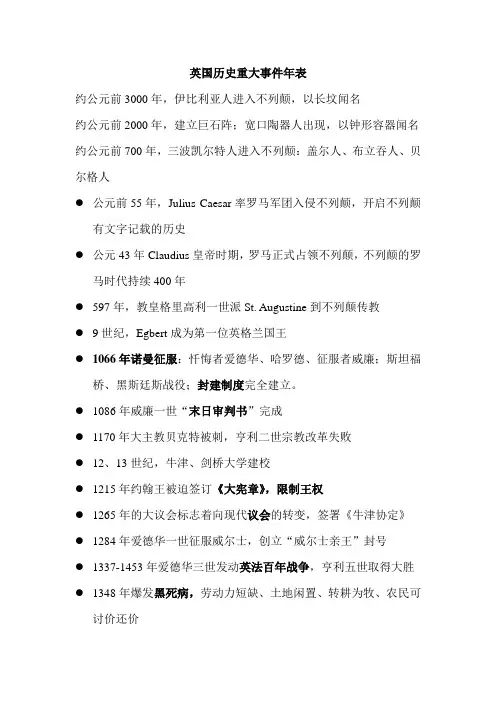
英国历史重大事件年表约公元前3000年,伊比利亚人进入不列颠,以长坟闻名约公元前2000年,建立巨石阵;宽口陶器人出现,以钟形容器闻名约公元前700年,三波凯尔特人进入不列颠:盖尔人、布立吞人、贝尔格人●公元前55年,Julius Caesar率罗马军团入侵不列颠,开启不列颠有文字记载的历史●公元43年Claudius皇帝时期,罗马正式占领不列颠,不列颠的罗马时代持续400年●597年,教皇格里高利一世派St. Augustine到不列颠传教●9世纪,Egbert成为第一位英格兰国王●1066年诺曼征服:忏悔者爱德华、哈罗德、征服者威廉;斯坦福桥、黑斯廷斯战役;封建制度完全建立。
●1086年威廉一世“末日审判书”完成●1170年大主教贝克特被刺,亨利二世宗教改革失败●12、13世纪,牛津、剑桥大学建校●1215年约翰王被迫签订《大宪章》,限制王权●1265年的大议会标志着向现代议会的转变,签署《牛津协定》●1284年爱德华一世征服威尔士,创立“威尔士亲王”封号●1337-1453年爱德华三世发动英法百年战争,亨利五世取得大胜●1348年爆发黑死病,劳动力短缺、土地闲置、转耕为牧、农民可讨价还价●《劳工法令》Statute of Labours 禁止提高农民工资●1381年农民起义,理查二世欺骗起义军、谋杀瓦特·泰勒●14、15世纪,圣安德鲁大学、格拉斯哥大学、阿伯丁大学、爱丁堡大学在苏格兰建校●1455-1485玫瑰战争:爱德华四世胜利、爱德华五世失踪、理查三世被击杀、亨利七世建立都铎王朝●1529-1534年亨利八世进行宗教改革Reformation,确立英王为独立的英格兰教会最高领袖,脱离罗马教皇●1558-1603伊丽莎白一世统治●1588年击败无敌舰队Armada●文艺复兴Renaissance (1350-1650)和英国文艺复兴(1485-)●1605年火药阴谋案,天主教谋杀詹姆士一世失败,处决盖伊·福克斯,英国人庆祝11月5日“盖伊福克斯之夜”●1628第三次召集的议会向查理一世提出Petition of Right民权请愿书●1642-1649英国内战(清教革命、英国资产阶级革命)●1649年查理一世被处决,进入Commonwealth 共和国时期●1660年共和国瓦解,查理二世复辟Restoration●1688年光荣革命,威廉、玛丽共掌英国●1689年《权利法案》出台,君主立宪制确立●1707年《联合法案》规定英格兰、苏格兰合并,“大不列颠”产生;也规定苏格兰教会成为联合王国国教之一。
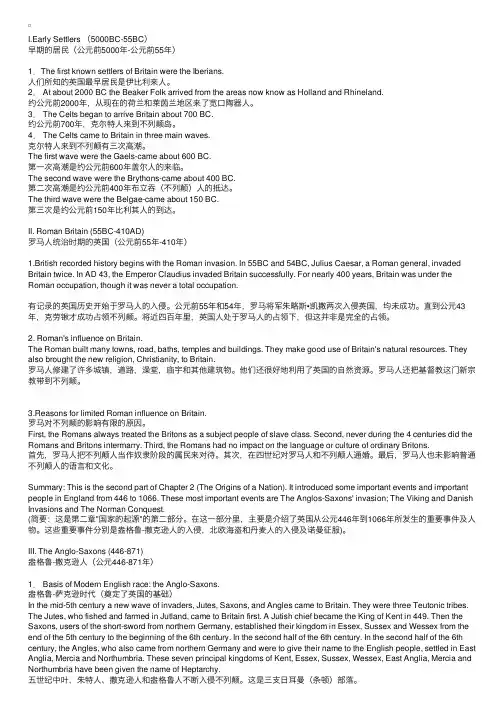
I.Early Settlers (5000BC-55BC)早期的居民(公元前5000年-公元前55年)1.The first known settlers of Britain were the Iberians.⼈们所知的英国最早居民是伊⽐利来⼈。
2. At about 2000 BC the Beaker Folk arrived from the areas now know as Holland and Rhineland.约公元前2000年,从现在的荷兰和莱茵兰地区来了宽⼝陶器⼈。
3. The Celts began to arrive Britain about 700 BC.约公元前700年,克尔特⼈来到不列颠岛。
4. The Celts came to Britain in three main waves.克尔特⼈来到不列颠有三次⾼潮。
The first wave were the Gaels-came about 600 BC.第⼀次⾼潮是约公元前600年盖尔⼈的来临。
The second wave were the Brythons-came about 400 BC.第⼆次⾼潮是约公元前400年布⽴吞(不列颠)⼈的抵达。
The third wave were the Belgae-came about 150 BC.第三次是约公元前150年⽐利其⼈的到达。
II. Roman Britain (55BC-410AD)罗马⼈统治时期的英国(公元前55年-410年)1.British recorded history begins with the Roman invasion. In 55BC and 54BC, Julius Caesar, a Roman general, invaded Britain twice. In AD 43, the Emperor Claudius invaded Britain successfully. For nearly 400 years, Britain was under the Roman occupation, though it was never a total occupation.有记录的英国历史开始于罗马⼈的⼊侵。
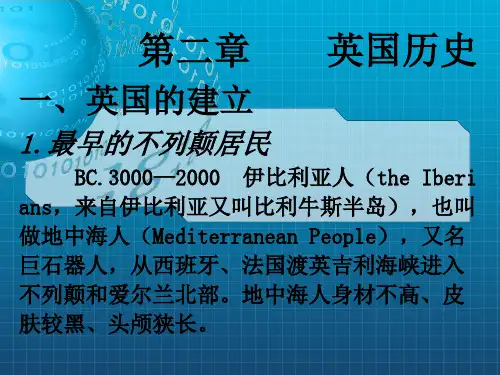
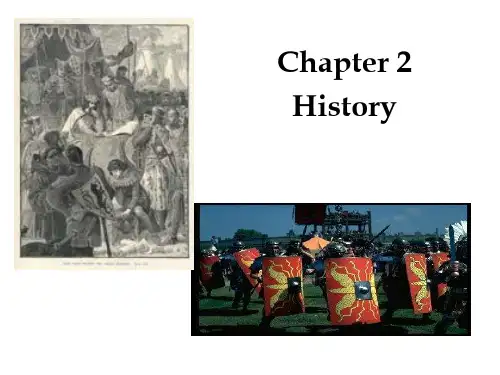
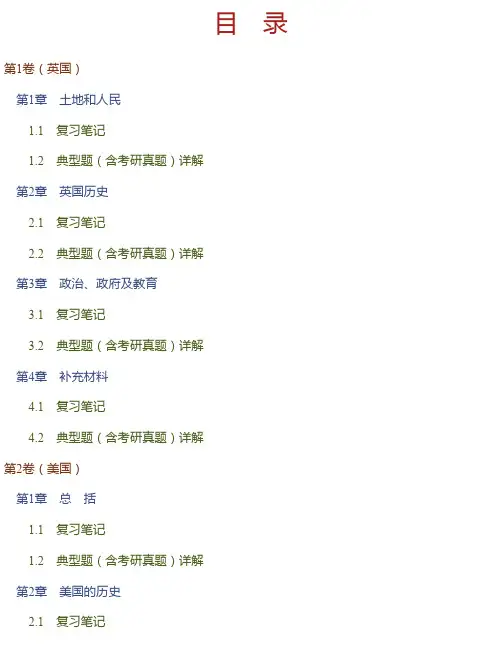
目 录第1卷(英国)第1章 土地和人民1.1 复习笔记1.2 典型题(含考研真题)详解第2章 英国历史2.1 复习笔记2.2 典型题(含考研真题)详解第3章 政治、政府及教育3.1 复习笔记3.2 典型题(含考研真题)详解第4章 补充材料4.1 复习笔记4.2 典型题(含考研真题)详解第2卷(美国)第1章 总 括1.1 复习笔记1.2 典型题(含考研真题)详解第2章 美国的历史2.1 复习笔记2.2 典型题(含考研真题)详解第3章 政府形式和社会生活3.1 复习笔记3.2 典型题(含考研真题)详解第4章 补充材料4.1 复习笔记4.2 典型题(含考研真题)详解第1卷(英国)第1章 土地和人民1.1 复习笔记Ⅰ. The British Isles and Great Britain1. Full name2. Constituents3. Introduction of Each Part4. Physiographic Features5. Climate and W eather6. Factors Influencing English W eather7. Inland W ater8. The English LanguageⅡ. People and the State1. People2. Party Politics3. Central Government4. Local Governments5. Law6. Reform of the Law Court7. Legal Profession8. Police Force9. Religion10. Characteristics of the English PeopleⅢ. National Economy1. General Survey2. Company Law and Framework of Industry3. Heavy and Light Industries4. Textile Industries5. Agriculture6. Transportation and Communication7. British Disease and Thatcher’s Medicine8. CitiesⅠ. The British Isles and Great Britain (不列颠群岛及大不列颠)1. Full name (全称)The United Kingdom of Great Britain and Northern Ireland大不列颠及北爱尔兰联合王国2. Constituents (组成部分)(1)The Island of Great Britain: England, Scotland and W ales大不列颠岛:英格兰、苏格兰和威尔士(2)Northern Ireland北爱尔兰3. Introduction of Each Part (各部分简介)(1)England (英格兰)England is the largest and most developed of all the three political divisions.英格兰是三个中最大的和最发达的政治分区。
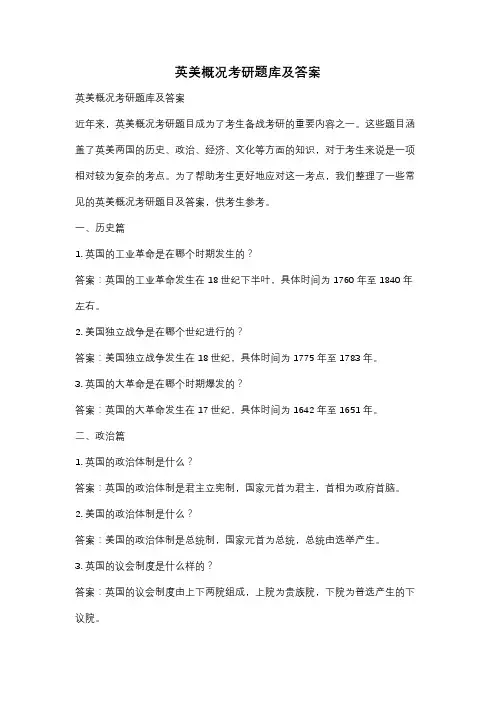
英美概况考研题库及答案英美概况考研题库及答案近年来,英美概况考研题目成为了考生备战考研的重要内容之一。
这些题目涵盖了英美两国的历史、政治、经济、文化等方面的知识,对于考生来说是一项相对较为复杂的考点。
为了帮助考生更好地应对这一考点,我们整理了一些常见的英美概况考研题目及答案,供考生参考。
一、历史篇1. 英国的工业革命是在哪个时期发生的?答案:英国的工业革命发生在18世纪下半叶,具体时间为1760年至1840年左右。
2. 美国独立战争是在哪个世纪进行的?答案:美国独立战争发生在18世纪,具体时间为1775年至1783年。
3. 英国的大革命是在哪个时期爆发的?答案:英国的大革命发生在17世纪,具体时间为1642年至1651年。
二、政治篇1. 英国的政治体制是什么?答案:英国的政治体制是君主立宪制,国家元首为君主,首相为政府首脑。
2. 美国的政治体制是什么?答案:美国的政治体制是总统制,国家元首为总统,总统由选举产生。
3. 英国的议会制度是什么样的?答案:英国的议会制度由上下两院组成,上院为贵族院,下院为普选产生的下议院。
三、经济篇1. 英国的经济体制是什么?答案:英国的经济体制是资本主义经济体制,市场经济占主导地位。
2. 美国的经济体制是什么?答案:美国的经济体制也是资本主义经济体制,市场经济占主导地位。
3. 英国的主要经济产业有哪些?答案:英国的主要经济产业包括金融、制造业、服务业等。
四、文化篇1. 英国的莎士比亚是哪个时期的作家?答案:莎士比亚是文艺复兴时期的作家,活动于16世纪末至17世纪初。
2. 美国的哈佛大学是哪个世纪建立的?答案:哈佛大学建立于17世纪,具体时间为1636年。
3. 英国的摇滚乐队披头士是哪个时期的代表?答案:披头士乐队是20世纪60年代的代表,对摇滚乐产生了重要影响。
总结起来,英美概况考研题库涵盖了历史、政治、经济、文化等多个方面的知识点。
通过对这些题目的学习和了解,考生可以更好地掌握英美概况的重要内容。
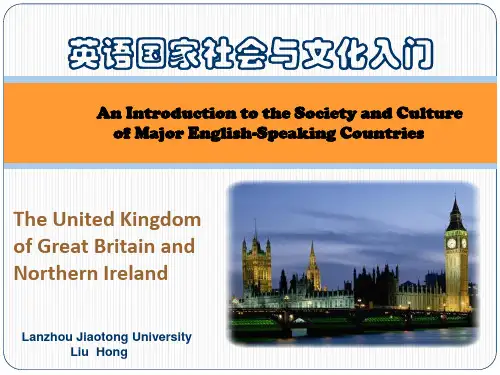
英美概况英国部分第四章Chapter4一、教学内容本节课的教学内容选自英美概况英国部分第四章Chapter4。
该章节主要介绍了英国的历史、地理、政治、经济、文化等方面的基本情况。
具体内容包括英国的历史沿革、地理特征、政治体制、经济发展、教育体系、文化传统等。
二、教学目标1. 让学生了解英国的基本情况,掌握英国的历史、地理、政治、经济、文化等方面的知识点。
2. 提高学生的英语阅读理解能力,增强对英国的了解和认识。
3. 培养学生的跨文化交际意识,提高与人交流的能力。
三、教学难点与重点重点:英国的历史沿革、地理特征、政治体制、经济发展、教育体系、文化传统等基本知识点。
难点:英国政治体制的复杂性,以及相关术语的解释,如君主立宪制、首相、议会等。
四、教具与学具准备教具:PPT、黑板、粉笔、教材学具:笔记本、文具盒、课本五、教学过程1. 实践情景引入:以英国的自然风光、著名景点为例,引导学生了解英国的基本情况,激发学生的学习兴趣。
2. 课堂讲解:(1) 英国的历史沿革:从罗马时期、中世纪、工业革命到现代英国,简要介绍英国的历史发展。
(2) 英国地理特征:介绍英国的地理位置、地形地貌、气候特点等。
(3) 英国政治体制:讲解英国的君主立宪制、首相、议会等政治制度。
(4) 英国经济发展:介绍英国的经济体系、主要产业、国际贸易等。
(5) 英国教育体系:阐述英国的教育制度、著名大学、基础教育等。
(6) 英国文化传统:讲解英国的文化遗产、文学、艺术、体育等方面的特点。
3. 例题讲解:选取具有代表性的例题,讲解英国的基本知识点。
4. 随堂练习:布置相关的练习题,让学生巩固所学内容。
5. 课堂互动:鼓励学生提问、发表观点,增强课堂的趣味性。
六、板书设计板书英国基本情况板书内容:历史沿革:罗马时期、中世纪、工业革命、现代英国地理特征:地理位置、地形地貌、气候特点政治体制:君主立宪制、首相、议会经济发展:经济体系、主要产业、国际贸易教育体系:教育制度、著名大学、基础教育文化传统:文化遗产、文学、艺术、体育七、作业设计1. 请简述英国的历史沿革。
Chronology of British GovernmentMonarch Date of Rule Deeds Events CommentsGermanic/Scandinavian RuleAlfred the Great 871-899 1Defeated“Danlaw” expansion& regained land2establishednavy and garrison3introductionof Christanity toDames, firstpublic schools fornobledescendances andmagistrates4Anglo-SaxonChronicleAnglo-Saxon WessexlineEdward the elder Anglo-Saxon Wessexline;Son to AlfredAthelstan Anglo-Saxon Wessexline;Son to EdwardEdgar thePeaceful959-975 Anglo-Saxon WessexlineEthelred the Unready 978`1016 Invaded England Anglo-Saxon Wessexline;Sweyn Forkbeard, King ofDenmarkCanute 1016-1035 1.chosen as king byWitan;2.UnitedEngland, Denmarkand Norway.Scandinavian ConquerorEdward the Confessor 1042-1066 1.facilitated theNormanConquer;2.Normanfeudal system adoptedSon of Ethelred theUnreadyHaroldGodwinson1066 defeated Norwegians Earl of WessexNorman French RuleWilliam I 1066-1087 5-steps tostrengthenreign inEngland:1.crushedallresistance,built castlesforprotection2.broke upSaxonearldomsestablishedcentralizedroyalgovernment.3.vicomtes4.sloventroyaltreasury,royalcoinage5.alliedwithRomanCatholicChurchdefeated Haroldand crowned WilliamI at WestminsterAbbey onDec.25,1066William the Conqueror,French duke connected tothe Wessex Line whofavored by Edward theConfessorWilliam II 1087-1100 Murdured William Rufus, 2nd son toWilliam IHenry I 1100-1135 Altered therelationshipbetweenKing andhisfollowers:1.chosebishops2.acceptedmoney3rd son of William Ifrom Barons instead of military service-exc hequerStephen &Maud 1135-1154 1.20-years of civilwar and anarchy;2.agreement toStephen’s rule andHenry II’s succession.Stephen:Grandson to William I;Matilda: Daughter to Henry IAngevin French – PlantagenentsHenry II 1154-1189 1.reform oflegislativesystem2.claimedvastterritoriesin Franceand Irelandthroughvariousfamilyconnections;3.alteredtherelationships betweensecular andreligiousauthorities-murderedof ThomasBecket/failure inreformingcanon law;4.invadedandestablishedEnglishSon to Maudkingdom in IrelandRichard I 1189-1199 1.ThreeCrusadesfor controlof holysites in theNear East;2.imprisoned byChristanallies forransom3.fought inFrance Oldest surving son of Henry II; Richard the LionheartedJohn 1199-1216 1.raisedpropertytaxes;2.struggleswith PopeInnocent IIIandinvasion ofPhilipAugustus In 1215. TenantRights movement &Magna Carta2nd surving son of Henry IIHenry III 1216-1272 1civil war in1263 and baronialtriumph;2establishmentof parliamentSon to John DisarstrousEdward I 1272-1307 1.began theHundredYear’s Waragainstwar; 1.1348-1349:Davastation of black deathresulting in the deathof 3/8population-laborshortage;2.1351:the futileStatute of LabororsSon to Henry IIIMilitary control over laboring class underwent changes: shift from old knight&castle system to expert archers&engineers;1Tensionsbetween classeshightened byreligiousdissension;2nationalismaroused, Englishgained popularityRichard II 1377-1399 Confiscatedthe estatesof his uncleJohn,violatingthe law ofinheritance 1.1378-1380,”HeadTax” imposed by Johnof Gaunt;1381, Peasants’RevoltSon to the Black Prince,Grandson to Edward IIILancatriansHenry IV 1399-1413 1.Rebelledby cousinHenry,defeatedRichard2and forcedhim toabdicateandmurderedhim;2.illegallyseizingpower-losttheprotectionof laws ofinheritance-spent much Grandson to Edward III,consin to Richardof his reignsuppressingrebellion.Henry V 1413-1422 Assertingauthorityboth inFrance&athomeHenry VI 1422-1461 Deposed byEdwardYorkist andmurdered(1461) War of Roses(1455-1485)Weak King with dividedgovernmentYorkistsEdward IV 1461-14701471-1483 Briefly ousted frompower by his brotherClarence & hisprevious supporters in1470.Grandson of Edward IIIEdward V 1483 MurderedRichard III 1483-1485 Defeatedand killedin theBattle ofBosworthyby HenryTudor The Battle ofBosworthyBrother of Edward IVTudorsHenryVII 1485-1509 1united theHouse of Yorkistsand Lancastrianby means ofmarriage withYorkist’sElizabeth andestablished theTudor House.2the Star Grandson of EdwardIII; Earl of RichmondChamber-consoli dation of his position;3Morton’s Fork-turned treasury deficit into a surplus;4the threat of revocation to gain trading prileges for English merchants abroad;5Education fundsHenryVIII 1509-1547 1CardinalWosley-lastestablished theconcept“Balance-of-Power” as basis ofEnglish foreignpolicy,1521 crisis2creation ofthe Royal Navy,strengthening centraladministrative&maintainingadequate supervisionof local government31535-incorporrated Wales &England on equalterms in the firstAct of Union;4Middle-classdominatedParliament infavor of the King5Anti-clericalRevolution,1554theAct of Supremacy- Son of Henry III;selected by Privy Council;WelshmanDissolution ofmonasteries6. 1537-1542: Irishanarchy, “Pilgrimageof Gr ace” by Catholicthe Statute ofthe Six ArticlesEdward VI 1547-1553 Parliament’s effort ofreligious unityUncles served as regentsMary I 1553-1558 1.Marriedto CatholicSpanishKingPhilipII,turningEngland avassal ofSpain;2. Lost thelast Frenchlands-thePort ofCalais-as aresult ofsupportingSpainagainstFrench inwar;3.appointedCatholic astheArchbishopofCanteburyandCatholicworshipreturned tolocalchurches. Elder daughter to HenryVIII,selected by the Privy Council, Roman Catholic, Bloody Mary.Elizabeth I 1553-1603 1.twodisarstrouspoliciesaggravatedthe Irishproblems:a. grantingthearistocracycommercialand estatemonopoliesin Irelandformoney&support;b.sentpoorlytrainedhighlyambitiousandavariciousfavoritesas militarycommanders to Ire.1crisis: warwith CatholicSpain caused byCatholic hatred ofProtestantism andEnglish rivalryfor globaltrade&ultimatecontrol of oceans;the destruction ofSpainish Armada in1588 and GB ruledthe sea;21597-1601:Hugh O’NeilRevolt3theflourishing ofcultureRenaissance(Shakespeare,Marlowe,Donne,Johnson, FrancisBacon, Harvey,Gilbert, KingJames Bible of1611)4the economicprosperity basedon individualenterprise inmany fieldsYounger daughter ofHenryVIII, Protestant,Catholic illegitimate,Intelligent, highly-educated,proud, calculating,self-control, rivaled byMary Queen of Scots, Apolitician and a survivor.The Stuart and CommonwealthJames I 1603-1625 1.peacefully united theEnglandand 1.1621. The House ofCommons drew upthe GreatProtestant-first of theGrandson of Henry VII, Sonto Queen Mary of Scots,highly-educated, conceitedand stubbornScotland in politics; 2. New ways to raise revenue without parlimentar y approval:se lling nobilities& awarding Elizabethan monopolies 3.the failed attempt of openly seeking a Catholic Spanish princess as daughter-in -law,startin g the fires with Parl.4. No bishop, no king. Favored the High Church. great documents of English Revolution.2. 1624, Chales’ betrothal to French Catholic Princess.3. the origin of GUY FAWKES Day.4. 1607, the establishment of the first English colony in North America on the Atlantic coast at Jamestown, Virginia for commercial reasons.1620, the second at Polymouth Massachusetts, founded by Pilgrims for religious reason.5. 1609,the first English factory establish in India.Charles I 1625-1649 1.1628, the Petition ofRight, first statingsome most basic rulesof modernconstitutionalgovernment;2. 1629, Kingdissolved parliamentand imprinsoned 9leaders in LondonTower; Son of James I, beheaded by order of the RUMP parl.1629-1640:non-parlia ment rule;3. 1638, Scottish rebellion: fuse of the English Revolution.4. Charles reconvened the parliament in need of money-Short Parl.-soon dissolved.5.Scotts invaded England-Long Parl. of the Revolution-Parl. abolished taxes and unpopular royal administrative courts & meet every 3 years.6. Irish rebellion, massacring northern Irish Protestants; 1641, Grand Remonstrance.7. the Civil War (1642-1649)Oliver Cromwell 1649-1658 1 1.claimed theEngland republicasCommonwealth;2 2.1651, theNavigationAct-embargo onDutch Shipping;3 3.1654,solvedScottish and Irishproblems withviolence4 4.1652,Englishships defeated theDutch and Patriotic Englishman, strong-minded, stubborn, no pathological drive for power, puritan, Lord Protectormastered thenorthern sea.5 5.Dissolved theRump andestablishedhimself as “LordProtector”, choseNew Parliamentbased on the onlywrittenconstitution ofEngland-theInstrument ofGovernment.6 6.Puritans passed“blue laws” in aneffort to imposepuritan lifestylein the country Richard Cromwell 1658-1660Restored StuartCharles II 1660-1685 1dissenterswere excluded byParliamentparticularly in theaccsess to Uni,resulting in thedomination of anonconformistconsciense inpublic life;2Disarsters:theBlackDeath(1665-1666);the Great Fire inLondon3Dutch War of1665-1667,England seizedcommercial Selected by parliament; chief minister of Parliament dominates the monarchy; period of public pursuit of pleasure, loose morals,festive court life and indecent witsupremacy from the Dutch. 41670, the Hudson Bay Company was granted exclusive right to trade by the Hudson Bay in Canada.James II 1685-1688 1687,issued a“Declaration ofIndulgence”1688,fled toFrance. The bloodlessGlorious Revolution(1688-1689)Youger son of Charles,outspoken Catholic, I exiledby Parl.William III &Mary II 1688-1702 1Bill of Rights21690,Battleof Boyne, JamesII and hissupporting IrishRoman Catholicdefeated, thusIrish R.C weredeprived therights ofeducation andcommercialparticipation;31701,Parliamentpassed the Act ofSettlement,promising the crown tothe ProtesetantSophia, whichdirectly pavedway for theHanover’srule;establishingRule by Mary, the elderdaughter of James II and herhusband, William of Orangethe Parl’s right todecide whowould rule.Ann 1702-1714 1702,first Englishdaily newspaper:theDaily Courant1707,England andScotland formallyunited under the nameof Great Britian.Daughter of James IIHanoverians(German Line)Monarch PrimeMinisterParty Deeds Events CommentsGeorge I (1714- 1727) RobertWalpole(1721-1742)Whig 1Status:theFirstLord oftheTreasurytheconfidantof the kingand theleadingminister inthe Cabinetmostinfluentialmember ofthe Whig inthe HOC.2Principal:makethecountryprosperous byGrandson of James I, notinterested in England at all.;encour aging trade and industr y;3tryi ng to reduce politica l and religiou sstrife& avoid foreign entangl ements. 4the emerge nce of Cabinet and the Prime Ministe r.517 27, Robert Walpol e became P.M.George II (1727- 1760) RobertWalpole(1727-1742)Whig 1737,positionweakenedbecause ofthe death ofQ.C;1742,resigned.1.the Seven Year’sWar between Austriaand Prussia,Francefor A while Britan forP.2. in 1757, WilliamPitt the elder becamea leader in EnglishGovernment, whichwas the first instancein English history of aSon of George I;Peppeted by QueenCaroline and P.M. Walpolein politics.Earl ofWilmington(17Whig42-174 4) king being compelled to accept a distrusted and disliked man as PM.3.fighting France in Europe, America and India.4. General Wolfe’s English army defeated the French foreces led by General Montcalm at Quebec, leading to the French control of Canada and resulted in the Peace Treaty of 1763, France ceded Canada to GB.Henry Pelham (1744-1754)WhigDukeofNewcastl-e(1754- 1756)WhigDukeofDevonsh-ire(1756- 1757)ToryEarl ofBute(1762- 1763)ToryGeorge III (1760- 1820) GeorgeGrenville(1763-1765)Whig 1Whigs lostdivided and lostsupport;2forced Pitt toresign by refusingto declare war onSpain as a firststep to increasepower.31763, theSeven Year’s Warended, gainedlands from Peaceof Paris.41760-1770:aFarmer George;Taught by his motherexaggerated ideas of royalpower; wanting the crownto resume administeringaffairs and determininggovernment policy ;wanting direct authorityover cabinet in the placeof the Parl.Marquess ofRocking-ham(1765-1766)whigWilliam Pittwhigthe Elder (1766- 1768)capriciousCabinet5 5.1776,AdamSmith publishedAn Inquiry intothe Nature andCauses of theWealth of Nations6During1750-1761:battleswith France forcommercialcontrol in India,Rober Clivemanagedthriumph-madethe East IndiaCompany aterritorialpower.-1784Pitt’s IndiaACT-making thegovernor-generalsupreme&creating a Board ofControl.1789, consolidation by Richard Wellesley77.After 1783550male and200femaleconvicts sent toAustrilia for thereliefe ofcongesgtion inEnlish prisonsand settled inSydney in 1788.88.1773,acknowledge theDukeofGrafton (1768- 1770)whigLordFrederickNorth(1770- 1782)ToryMarquess of Rocking-hamWhigEarl of Shelburne(1782- 1783)WhigDuke of Portlan d 1783 Coa- litionWillia m Pitt, the Younge r (1783- 1801) Tory In1781,elected to Parl.1782,chancellorof theexchequer1783,theyoungestP.M. Principal:1.eliminating the national debt,2 cutting down on government expenditure sanizing a system of auditing the national accounts 4.introduci ng order to the national finances chaos.5.advocating the abolition of the slave trade,parlia mentary reform and the removal of restrictions on Roman Catholics.6.1789,preve nting the influence of French revolution from spreading in England;17 94,suspendindependence ofNorth Americancolonies. 1774, the Quebec Act granted Catholic religious freedom and permitted French law to remain in force in all Canadian civil matters.-1791 the Canada Act-divided the Canadian settlements into two provinces-Ontario& Quebec.1778,lost American colonies&national debts increased tremendously as a result of his personal rule.99.1780,a resolutioncalling for arestriction on thecrown waspassed.1010.1783,William Pittthe youngerelected P.M.1111.1800,Act ofUnion,mergingtheBritish and Irish Parl and leading to“the United Kingdom of Great Britian and Ireland.1212. 1790,Edmund BurkepublishReflections on theed he Habeas Corpus Act Achieveme nts:Comme rcial treaty with France in1787;succe ss in incoorperati ng Irish in to the British system of gvnmt by Act of Union.7. India Act of 1784Revolution inFreance againstthe FrenchRevolution;Thomas Paine’sRights of Man inprotest toEdmund.1313.IndustrialRevolution1414. thebeginning ofNapoleonicWar,LordNelson-therenowed BritishAdmiral.1515. 1812:British warshipsseized sailorsfrom Americanships-provokingWar of 18121616. 1815-Abroad:Battle of Waterloo- Allied armies defeated Bonaparte under the leadership of Lord Wellington. In Nov.,England, Russia, Austria and Prussia signed the Quadruple Alliance/Vienna Settlement to ensure the quarantine of FranceHome:economic changes-agriculture improved,countryside to larger farms;rural unemploymentHenrtAdding- ton(1801- 1804)ToryWilliam Pitt,theYounger(1804- 1806)ToryWilliamGrenville(1806- 1807)Whig Duke Toryof Portand (1807- 1809) increased;industrial cities grew rapidly,economic subjects exploited.;problems hightened by bad postwar-harvest,Euro pean competition,restrictiv e tariff on foreign grain kept high&starvation,paris h system failed the needs.SpencerPerceval(1809-1812)ToryEarl of Liverpool(1812- 1827)ToryGeorge IV (1820- 1830) Earl ofLiverpoolCulture:JaneAustin(1775-1817),CharlotteBronte(1816-1855),Charle s Dickens(1812-1870),Mrs ElizabethGaskell(1810-1865),Antho ny Trollope(1815-1882), ThomasHardy(1840-1928) Science:Major scientific theory clashed with religious dogma —Charels Darwin On the Origin of Species by Natural Selection (1895)George Cannin gViscou nt Goderi chDuke ofWelling ton。
2.The early Anglo-Saxons converted to Christianity.最早的盎格鲁-撒克逊⼈改信基督教。
The Anglo-Saxons brought their own Teutonic religion to Britain. Christianity soon disappeared, except among the Celts of Cornwall, Wales, Scotland and Ireland. In 597, Pope Gregory I sent St. Augustine, the Prior of St. Andrew's Monastery in Rome, to England to convert the heathen English to Christianity. In 579 St. Augustine became the first Archbishop of Canterbury. He was remarkably successful in converting the king and the nobility, but the conversion of the common people was largely due to the missionary activities of the monks in the north.盎格鲁-撒克逊⼈把⽇⽿曼宗教带到了英国。
除了康⽡尔、威尔⼠、苏格兰和爱尔兰中的克尔特⼈还信奉基督教外,基督教很快就消失了。
公元597,教皇格⾥⾼⼀世把罗马圣安德鲁修道院的副院长圣奥古斯丁派遣到英格兰,其使命是使异教徒的英国⼈皈依基督教。
公元579年圣奥古丁成为坎特伯雷⼤主教。
在使国王和贵族皈依基督教⽅⾯,奥古斯丁特别成功。
但是普通⼈的皈依很⼤程度上归功于北部修⼠们的传教活动。
英美概况(英国篇5:大英帝国的兴衰 )I. Whigs and Tories辉格党人和托利党人These two party names originated with the Glorious Revolution (1688). 这两个政党名称皆起源于1688年的光荣革命。
The Whig were those who opposed absolute monarchy and supported the right to religious freedom for Nonconformists. The Whig were to form a coalition with dissident Tories in the mid-19th century and become the Liberal Party. 辉格党人是指那些反对绝对王权,支持新教徒宗教自由权利的人。
辉格党人在19世纪中叶与持不同意见的托利党人组盟组成自由党。
The Tories were those who supported hereditary monarchy and were reluctant to remove kings. The Tories were the forerunners of the Conservative Party. 托利党人是指那些支持世袭王权、不愿去除国王的人。
托利党是保守党的前身。
I. Agricultural Changes in the Late 18th Century18世纪末的农业革命During the late 18th and early 19th centuries, the "open-field" system ended when the Enclosure Act was passed. The movement lasted for centuries. Agricultural enclosure had good as well as bad results:18世纪末、19世纪初的农业革命期间,随着《圈地法》的颁布,传统的"开放田地"制结束。
1.英国全称:the United Kingdom of Great Britain and Northern Ireland2.英国由四个部分组成,它们是:England ,Scotland ,Wales and Northern Ireland3.英国历史上的三次外族入侵:43AD the Roman Empire ,the late 8th century Scandinavia created a certain cultural divide between northerners and southerners in England ,1066 Normans William took the English throne ,and became William the First4.英国内战时间:1640双方:the Roundheads led by Oliver Cromwell ,the royalists led by Charles 1结果:the royalists armies were defeated and King Charles 1 was executed in 16495.“君权神授”的含义:“divine right of kings”means the sovereign derived his authority from God ,not from his subjects6.英国政府的三个组成部分及其职责:the Monarch :to symbolize the tradition and unity of the British statesthe Parliament :to vote for taxation ;scrutinize government policy ,administration and expenditure ;debate the major issues of the daythe Cabinet :to carry out the functions of policy-making ,the coordination of government departments and the supreme control of government7.英国的“大宪章”(Magna Carta)由哪位君主在什么时候签署,其内容是什么King John ,1215 ,placed some limits on the king’s ability to abuse his royal power8.英国的“权利法案”(the Bill of Rights )被通过的时间:16899.议会的组成及其成员:the queensthe House of Lords :the Lords Spiritual who are the Archbishops and the most important bishops of the church of England ,and the Lords Temporal which refers to those lords who either have inherited from their forefathers or they have been appointedthe House of Commons :about 650 MPs (members of Parliament ) elected by the people to represent them10.内阁元首:prime minister11.英国大选多长时间举行一次,选出了什么,其目的是什么every 5 years ,to elect about 650 members of Parliament ,to provide opportunities for people to influence future government policies and to replace those incompetent political leaders12.英国的两个主要政党:the Conservative party ,the Labour party13.英国社会的两个主要阶层,如何划分这两个阶层middle class ,working classbased on economy and education14.自1979之后英国历任首相及其任职时间:Marganet Thatcher 1979~1990 ConservativeJohn Major 1990~1997 ConservativeTony Blair 1997~2007 LabourGordon Brown 2007 ~至今Labour15.工业革命之父是谁,及其发明是什么James Walt ,steam engine16 .工业革命开始的标志:Jennifer’s hand-spinning machine17.英国教育的三个阶段及两个分枝primary education (5—11 years old ),secondary education (11-plus examination ,namely ,grammer school and comprehensive school ) ,higher educationstate school and private school18.英国最古老的报纸:the Observer (the world’s oldest national newspaper),the Times(British oldest daily newspaper)19.报纸的两大分类:the quality papers ,tabloid20.英国最大的广播公司:the British Broadcasting Corporation (BBC)21.Christmas 和Easter的意义:Christmas commemorates the birth of Jesus Christ .It is the biggest and most loved British holiday. Easter commemorates the Crucifixion and Resurrection of Jesus Christ. It is the most important Christian festival .22,英国文学:early writing :Geoffrey Chaucer ,《The Canterbury Tales》Elizabethan Drama:William Shakespeare, 《Romeo and Juliet》,《Hamlet》,《Othello》,《King Lear》,《Macbeth》the 17th century :John Milton,《Paradise Lost》,《Paradise Regained》,《Samson Agonistes》the 18th century :Jonathan Swift ,《Gulliver’s Travels》Daniel Defoe ,《Robinson Crusoe》the 19th century :Jane Austen ,《Sense and Sensibility》,《Pride and Prejudice》,《Emma》Bronte sisters,——Charlotte Bronte ,《Jane Eyre》Emily Bronte ,《Wuthering Heights》Ann BronteCharles Dickens,《Oliver Twist》,《David Copperfield》,《Great Expectation》。